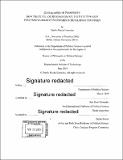Gatekeepers of prosperity : how the state and business block the path towards functioning market economies in Developing countries
Author(s)
Limoeiro, Danilo Rocha,1982-
Download1135893780-MIT.pdf (26.35Mb)
Alternative title
How the state and business block the path towards functioning market economies in Developing countries
Other Contributors
Massachusetts Institute of Technology. Department of Political Science.
Advisor
Ben Ross Schneider.
Terms of use
Metadata
Show full item recordAbstract
A well-functioning market economy is crucial for prosperity. However, there is considerable variation across countries in the cost of doing business. This invites the question of why governments impose these costs and why societies fail to enact reforms reducing them. This thesis seeks to solve this question by looking at the case of Brazil, a large economy riddled with state imposed transaction costs. It argues that the existence of a healthy business environment is analogous to the provision of a public good. The lack of it reflects an equilibrium where actors fail to coordinate. In this suboptimal equilibrium, political agents use discretion over transaction costs as a power resource. Business insiders nurture relationships with these agents, accessing low transaction costs and gaining a competitive edge over the outsiders. As such, insiders have weaker preferences for reforms that could decrease the overall cost of doing business. The four empirical chapters offer a diverse set of evidence substantiating this argument. First, Brazil's intricate tax system stems from politicians and businesses clinging to discretionary tax exceptions that benefit the few. Second, econometric analysis comparing patterns of lobbying among exporters suggests that industry leaders are the most politically engaged. They try to 'buy' access to power, rather than to push a reformist agenda. Third, the case of the pharmaceutical industry shows that stringent regulation affects the new entrants more than it affects incumbent rms. This heterogeneous outcome contributes to the absence of a coalition that would push back heavy regulatory standards. Fourth, the study of agriculture explains how convergence between insiders and outsiders involved in exporting activities enables collective action towards reforms. The thesis also highlights the relationship between state-imposed transaction costs to explain long term prosperity. These costs undermine growth by making capital less productive and limiting the pool of value-creating entrepreneurs. While secure property rights became a catchall explanation for development, social scientists will benefit from expanding their investigation towards overlooked dimensions of state-business relations.
Description
Thesis: Ph. D., Massachusetts Institute of Technology, Department of Political Science, 2019 Cataloged from PDF version of thesis. Includes bibliographical references (pages 347-376).
Date issued
2019Department
Massachusetts Institute of Technology. Department of Political SciencePublisher
Massachusetts Institute of Technology
Keywords
Political Science.